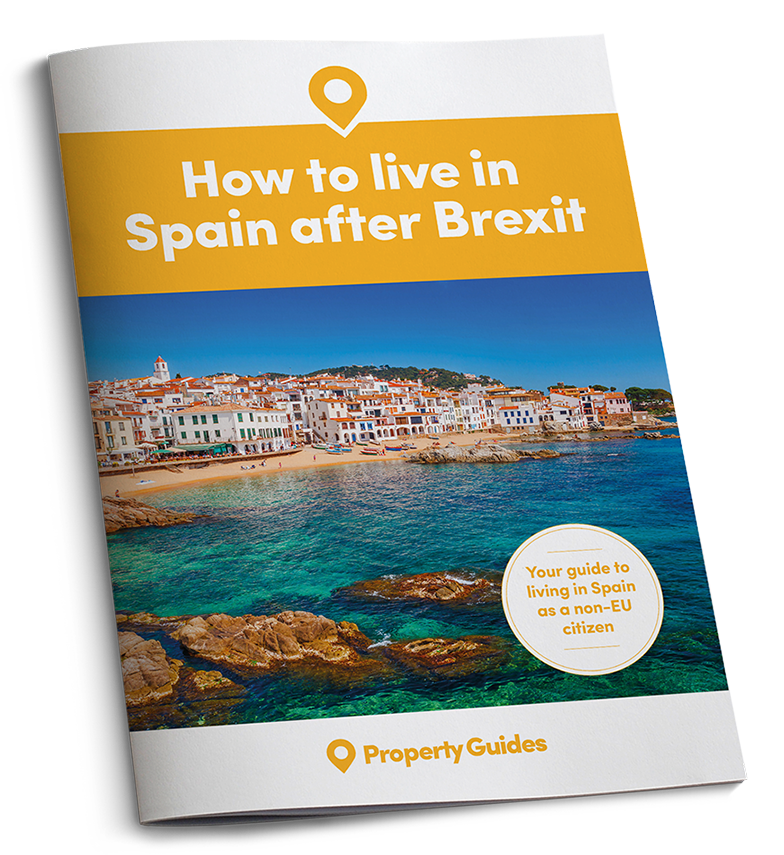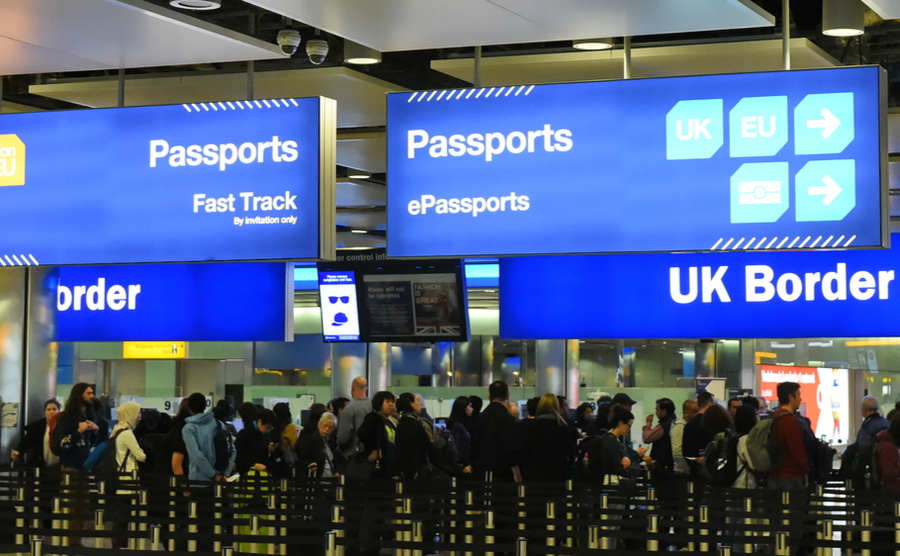Living in Spain after Brexit
Find out how Brexit might affect British people wishing to relocate or retire to Spain. Although not everything is certain yet after the Transition Period, this guide and regular updates run through possible scenarios and include the latest news.
See various options for living in Spain after Brexit by downloading the guide, How to Live In Spain after Brexit.

The After Brexit Guide will help you plot your way through a possible post-Brexit scenario, to ensure you can fulfil that dream of a wonderful lifestyle combining the best of our two cultures. The guide will help you to answer:
✔ How does a non-EU person access state healthcare?
✔ Will I be able to buy residential property in Spain?
✔ Could I take Spanish citizenship?
And many more important questions.
Download your free After Brexit guide
Can British people buy property in Spain after Brexit?
British people will still be able to buy a home in Spain after Brexit. Property is not covered under the EU’s ‘four freedoms’, and anyone has the right to purchase. If there’s no deal, you will still need to do a bit more paperwork to move there, but it’s no more than what thousands of Australians, Americans and so on do every year. In other words, you’ll need a visa, but it won’t be a hassle – you can see the number of options available to you in our visa page.
How do I buy property in Spain after Brexit?
Simply follow the same buying process that you do now – start looking for your home, speak to estate agents, arrange a viewing trip, speak to currency exchange to sort out how to transfer to euros and you’re good to go. The only additional layer will be visas, but you’ll have plenty of time to apply for one during the purchase process. You’ll only need it to move, not to buy a house.
Can I buy a holiday home in Spain after Brexit?
British people will still be able to buy Spanish holiday homes after Brexit. All you need, as above, is to follow the usual buying process and then apply for a temporary tourist visa (valid for three months) when you come to visit.
Previous news updates
News update 3 December 2019:
What could a Conservative victory mean for your post-Brexit move?
Current polling suggests that the Conservatives will be returned next week with a commanding majority in parliament. What will that mean for those who are unable to gain residency in the EU before the end of the transition period?
The Conservative party plans a tightening up of the rules on EU immigration if it wins the election next week. It is widely expected that this would be reciprocated by European Union countries for British people moving to the EU.
It is widely expected that this would be reciprocated by European Union countries for British people moving to the EU
There are five main planks to their immigration plans, and either could affect buyers in Spain if reciprocated.
1. No difference between EU and rest of the world
The manifesto says: “We will treat EU and non-EU citizens equally. Regardless of whether they are from Europe or another part of the world, we welcome people who meet our criteria.” Anyone hoping, therefore, that some sort of special arrangement might operate between those countries where Brits and local people traditionally move, such as between Spain and the UK, may be disappointed.

A US-style ESTA system will operate between the UK and Europe
2. US-style ESTAs for travel to/from the EU
As outlined by Home Secretary Priti Patel this week, rather than being allowed to travel to the UK on a national identity card as at present, EU citizens will need (a) a biometric passport and (b) to have pre-approval. She said: “In future, EU citizens will require an Electronic Travel Authorisation prior to travel, much like the US ESTA system.”
The ESTA for the USA requires visitors to the USA to apply at least three days before their travel and to pay $14 for a card that lasts five years. Every person needs one, including children. Failure to do so means they get turned away at the border (or refused boarding to their flight). The USA isn’t alone in this. Canada has a similar system called the eTA, which costs C$7, while New Zealand’s version, the NZETA costs NZ$9.
All the above systems are easy to apply for within minutes online and though you do pay initially they last for several years.
They also plan to “count in and count out” EU citizens to ensure they can be identified if they overstay the three-month travel limits likely to be imposed.
3. A points-based immigration system
The Conservative manifesto says: “We will create bespoke visa schemes for new migrants who will fill shortages in our public services, build the companies and innovations of the future and benefit Britain for years to come.” The basis of an application will be an Australian-style points-based immigration system.
This is where you score points for how desirable the government sees you as an immigrant. In particular, they give priority to people who speak good English and have good qualifications. Will Spain impose a similar system on British retirees?

Home Secretary Priti Patel (Twocoms / Shutterstock.com)
4. Legal restrictions?
The Home Secretary said that the plans were intended to prevent terrorists and other dangerous criminals from entering the UK. However, could the UK, like the US, implement far more draconian restrictions? After all, the US immigration officials advise that people “who have been arrested, even if the arrest did not result in a criminal conviction, have a criminal record, certain serious communicable illness, have been refused admission into, or have been deported from, the United States, or have previously overstayed under the terms of the Visa Waiver Program…” will be prevented from automatic entry.
If similar rules are introduced to the UK, and reciprocated by the EU, could it a youthful indiscretion 40 years ago prevents you retiring to the EU?
5. Access to healthcare and benefits
The manifesto says that people coming into the country from the EU will only be able to access unemployment, housing, and child benefit after five years. This is the same as for people moving here from non-European Union countries. Bear in mind that under Theresa May the health secretary was suggesting that a continuation of the EHIC system would be possible. So this is quite the departure.
The good news: The good news is that many thousands of non-EU nationals live in Spain, with a variety of visa options.
Update: 16 November 2018

Theresa May delivers her Brexit agreement, 14th November 2018
Deal or no deal: what does each mean for your property in Spain?
After Brexit, either with a deal or no deal, the British will be “third-country” nationals when viewed from Spain. But we won’t be the only ones. The Spain Property Guide has readers from Sydney to San Francisco, the UAE to Brazil, but it is only from the UK, lately, that readers have been worrying about healthcare, visas and buying property.
Why the worry? Spain Property Guides has delved deep into the likely Brexit scenarios – soft Brexit, hard Brexit or no deal – and we are confident that there are no realistic circumstances whereby British people need to abandon their dream.
British people will have (a) no problem buying property in Spain and (b) little extra difficulty or expense living there. Even with no deal. Here is how we reached those conclusions:
Property ownership is not one of the EU’s four freedoms and so your right to buy property in Spain will not affected.
Property
Ownership of property is not one of the EU’s four freedoms (goods, capital, work and services) and so your right to buy property in Spain will not be affected. That applies in whatever form Brexit happens, even with no deal.
Health
A Brexit deal should mean we can rule out worries over healthcare. The current plan, as outlined by the UK Health Secretary, is for the UK to continue the EHIC system and cover the cost of reciprocal healthcare in EU countries. This will cover British retirees and “those with chronic conditions, disabilities or other long-term conditions that require ongoing medical attention.”
A Brexit deal should mean we can rule out worries over healthcare.
In the event of no deal you may need health insurance until a new EHIC system can be worked out.
- If you’re NOT living in Spain full time, normal travel insurance should suffice.
- Those working in Spain will pay into the Spanish social security system and will be covered.
- If you are on a long-term visa you may need comprehensive insurance. There is already a wide variety of options available for as little as €300 per month.
Visas
British people will automatically become ‘Third Country’ nationals in Spain. The good news is that European leaders have stated categorically that even with no deal people from the UK will not require a visa for visits of 90 days or fewer in every 180. So you can travel backwards and forwards as many times as you like.
If you stay for longer than that, you may need a visa.
Working: The British government says that EU citizens moving to work in the UK after the transition period will need a work visa. We can assume that would be reciprocated by Spain. If you need a work visa you will be just like the hundreds of thousands of non-EU people successfully working in the UK. If you want to, it is perfectly possible to learn Spanish, get your UK qualifications recognised, and work in Spain. Why not give it a try?
Other options include investor visas, company transfers and the European Blue Card. There is also the Irish passport option. Over 10% of the British population qualifies for one, and the processes to apply are simple and inexpensive.
Retiring: Nothing has yet been announced about the “economically inactive” moving countries. A visa waiver system may be implemented as they won’t be taking jobs from local people. You may have to prove sufficient income to avoid being a burden on the state. We don’t know how much that will be in Spain, but in France it’s an income of €10,000 for one or €15,000 per couple.
Third country nationals need a visa if staying for more than 90 days in any 180. So you will be able to live in Spain for half the year.
Of course there may be paperwork involved – but Spain has a modern and well-run bureaucracy and we are confident that the processes will be simple and transparent, as they are for American and Australia buyers today. In short, even with no deal, there are many ways to get a visa for Spain, most of them are quite painless.
Your questions answered
“I’m buying a holiday home”
No problem. Nothing should change.
“I’m buying investment property”
Buy away, there will be no restriction.
“I’m retiring”
You may need a visa, but we expect it to be a simple system or visa waiver. At worst, the long stay national visa (visado nacional) costs around €100. There is also a ‘golden visa’ if you spend €500,000 on a Spanish property.
“I’m just visiting my home!”
You will have no problem at all traveling to Spain. Other Third Country nationals such as Americans, Australians etc. don’t need a tourist visa for Spain, and we have had no reports of them being held up unduly at customs
Brexit positives
Not only are the potential problems with Brexit likely to have been seriously overblown, but there will be benefits too.
- The worries of so many British people about Brexit – we believe unfounded – have held back demand for Spanish property. This is a great time to buy for those willing to fill in a couple of extra forms!
- Similarly, the evidence is that some Brits in Spain are returning to the UK, gaining from the weakness of the pound compared to pre-Referendum levels. This is a real opportunity to make an offer on under-priced property.
If you are ready to move to Spain, contact the Spain Resource Centre on 020 7898 0549 or email [email protected].
If you are still at the planning stage, download the Spain Buying Guide.
Update: 08 October 2018, What should you know about moving to Spain with six months to Brexit?
Spain Property Guides has had questions from some of our readers who are worried about Brexit impacting their chances of buying a home in Spain. Fortunately, the answer is that property isn’t affected by Brexit – so you can continue your plans safe in the knowledge that you can still buy here.
Brexit doesn’t impact property
Whether you’re allowed to own property or not in Spain isn’t controlled by the European Union. It is sometimes simpler in terms of paperwork, but ‘third-country nationals’ can still easily buy a home here. The government actively encourages investment, in fact. Plus, many non-EU nationals, like Australians and Americans, can still stay in Spain for three months without a visa – so there’s no reason the same won’t apply to UK citizens.
Proving you live in Spain
If you do move to Spain before Brexit and want to avoid any doubt over your right to live here full-time, it’s a good idea to get yourself registered. Find out how to do so in our article on registration in Spain.
Update: 24 September 2018, “No deal” advice through from government on pet travel and car insurance.
The UK government’s provided information on what we can expect in the case of a “no deal” Brexit for pet transport and car insurance.
UK nationals would need proof of third-party car insurance
If we leave the European Union without a deal, the UK will no longer be part of the ‘Green Card-free circulation area’. This means motorists will need to carry a Green Card to show proof of having car insurance. Normally, you should be able to request one from your insurance provider for free.
Motorists should expect documentation checks to take place upon entry to the Green Card-free area.
This is subject to agreements being reached between the UK Motor Insurers’ Bureau and those of other relevant countries.
“No deal” means live animals will require an EHC
Unless other rules are negotiated, anyone bringing a live animal from the UK – which will be outside the EU – into the EU will have to have an Export Health Certificate, signed by a vet or other authorising authority. They will have to go through an inspection process by Border Inspection Post and, after the inspection, the EHC would need to be signed by an ‘Official Veterinarian’.
For animals to be allowed to be exported to the EU, the UK would need to achieve ‘third-country’ status. If not, all exports would cease. However, other countries such as Australia have this status, so it seems likely.
Update: September 2018, Government offers “no deal” advice on passports, driving and roaming charges.
The UK government has announced what we can expect when travelling, driving and using mobiles in the EU after Brexit if the UK and EU don’t agree to a deal.
UK nationals may need at least three months’ validity on passports
British citizens after Brexit will be considered as third-country nationals, ie as non-EU citizens. UK nationals entering a Schengen country (any EU country apart from Cyprus, Romania, Bulgaria and Croatia) will need to check their passports meet these conditions:
- Have an issue date no more than ten years before the date of entering a Schengen country
- Have at least three months before the passport expires
Third-country nationals can stay in a Schengen country for three months. As such, the government advises that the second requirement may in fact be for six months, to cover those three months within the Schengen area.
Roaming charges will fall to commercial decision-makers
If the UK exits the EU without a deal, it’ll be outside of the ‘Roam like at home’ rules. These allow EU citizens to use their data in any other EU country the same as in their home country.
UK operators will no longer be under the EU regulations if there’s no deal. This means they’ll be free to set their own surcharges – so it’ll come down to a commercial decision. However, Vodafone, EE, 3 and O2 have all confirmed they don’t have any intention to increase surcharges. Other operators have yet to commit.
UK licences may no longer be valid in the EU
The UK government has confirmed that UK driving licences may no longer be valid in the EU, if there is no deal agreed. In this case, the rules would default to International Driving Permits (IDP). The same as when UK citizens drive outside the EU, they’d have to apply for one of these before being able to drive.
There are two types of IDP.
The 1949 Geneva Convention on Road Traffic governs the first type. After the UK exits the EU, they would be valid in Ireland, Malta, Spain and Cyprus. They last for 12 months.
The second type is governed by the 1968 Vienna Convention on Road Traffic. The IDPs from this convention are valid for three years in all EU countries apart from those listed above. It’d also be valid in Norway and Switzerland.
Currently, the first type is available from the Post Office or directly from private companies. By the time the UK leaves the EU, both will be taken over by the UK government and available from the Post Office. When UK nationals travel to the EU, they’ll need their UK driving licence and IDP.
With Article 50 being triggered, the countdown officially begins to the UK’s exit from the European Union. We don’t know what will be the result of the Brexit negotiations over the next two years. Will the British have a special status, or will we have the same rules as the other non-EU nations?
We don’t know, so this guide runs through a most extreme scenario, where the British have no more right to live and work in Spain than the citizens of any other non-EU country, such as the USA or Australia. We don’t believe Brexit will be as “hard” as this, but if you can work within these rules to live in Spain, when negotiations are complete and we know the reality it will probably be even easier to live there. Download this free guide using the short form below.
We partner with some of the most trusted names in the industry



Our team can help you buy a property in Spain
We have built a trusted team of experts to help you along the way – experienced estate agents, bilingual lawyers, tax and financial advisors, and expats who have made the move themselves and can share their unique knowledge and experience with you to make sure you have access to information that is not readily available elsewhere. This team includes our expert expat, Sally Veall, who has lived in Spain, France and Italy, and has been through the process of buying overseas property herself, so is well placed to guide you through the various pitfalls and offer tips to make the most of your property purchase and life in Spain. Sally writes free newsletters and articles for our readers, covering all aspects of buying, moving and living in Spain.
Spain Property Guide experts on the ground
In addition to our Resource Centre in London, we have a dedicated team based in the Spain Property Guide offices in Cala de Mijas, on the beautiful Costa del Sol, are here to help make your Spanish property purchase is a success. Both experienced teams can help answer any questions and offer advice on the different aspects of buying property in Spain, here to support you before and after you travel to Spain, and are on hand to share their knowledge of your chosen region of Spain and connect you to the right professionals to meet your particular needs.

